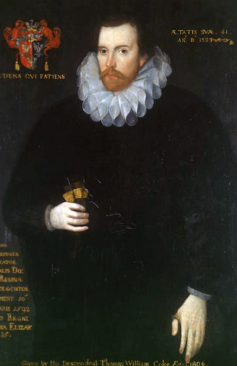Where is Edward Coke When We Need Him?
By Charles B. Parselle
Published on August 19, 2011

In a speech in Michigan on January 7, 2005, President Bush linked lawsuits with job losses: “In order to make sure jobs stay here, and jobs are increased here, we must be more competitive. And in order to do so, it seems to me, it makes sense to reform our legal system.” The President explained the linkage between lawsuits to job losses with striking simplicity: “Frivolous and junk lawsuits cost the economy about $240 billion a year.” The Manhattan Institute’s Center for Legal Policy claims: “Since 1975, lawsuits have cost the U.S. economy almost $3 trillion.”
Accompanying President Bush was Professor Brickman of Cardozo Law School in New York, who told the audience “out of approximately 850,000 claimants since asbestos litigation began, perhaps 600,000 of these are largely baseless claims. Nonetheless, they have generated tens of billions of dollars in payments, and billions of dollars in fee income for lawyers.” One can only wonder in what comatose condition were the defense firms that opposed them and the judges who allowed them.
Though the ballot initiative to cap contingency fees in California at 20% of the net recovery was withdrawn by its sponsor on April 4, 2005, it could be re-filed another year. It repeated the theme of frivolous and baseless, stating: “excessive fees create an economic incentive for lawyers to file false or frivolous claims…”
The medical profession wants a whole new legal system just for doctors. The AMA House of Delegates passed a resolution in late 2003 calling for “an alternative judicial model for addressing medical liability claims based on special medical courts.” The medical profession has a champion in Bill Frist, M.D., Senate Majority Leader, who in July 2004 called for “an expert medical court system with transparent decisions, limits on punitive damages and scheduled compensatory damages.” The AMA’s model legislation states: “ the current judicial system is ill equipped to handle the complex issues often involved in medical ability cases.” The president of the AMA says, “Jurors are not expert enough to determine what the standard of care is.” Doctors want damage caps as well as special courts, claiming they are inundated with malpractice claims.
In California, the long-standing court-funding crisis is not much improved since 2003 when Chief Justice George said: “California courts find themselves in one of the most difficult financial times in history,” and on March 15, 2005 in his state of the judiciary address, he said “It has been a difficult year for the judicial branch…due to the budget crisis affecting our state… California’s courthouses are in a state of serious disrepair and, in some instances, dysfunctionality.” Yet California is one of the world’s richest “countries,” with an economy nearly twice the size of New York and Texas combined.
Is this concatenation of events coincidental? Perhaps “false, junk, baseless and frivolous” are merely adjectives du jour, but it wouldn’t be the first time our legal system has withstood sustained attack. The common law is by far our oldest institution. It has existed since “time immemorial,” a phrase that has a precise common law definition meaning it pre-dates the year 1189. The first treatise on the common law by Glanvil was published in 1188.
The most intense and critical of all the common law’s battles was being waged around the same time the Mayflower sailed for America. Then the fight was about survival of the system of common law in the face of a growing trend towards absolutism that was to sweep through continental European countries. But in England the common law prevailed against absolutism, in substantial measure due to the efforts of one man, Edward Coke. Technically, the battle turned on the fine distinction between “prerogative absolute” and “prerogative ordinary.” Coke risked his liberty and his life by taking a stand based on the (then) 400 plus year old traditions and precedents of common law. The absolutist view was presented by “opposing counsel” of the most formidable kind, the king himself who not only asserted a prerogative absolute but backed up the assertion by throwing people into prison without charge or trial. Indeed, this fate befell Edward Coke who spent seven months in the Tower of London.
The king’s view of the law was “The king is the law speaking.” Coke’s response: “The king is under God and the law.”
The king asserted his royal prerogative to make laws by proclamation. Coke: “The law of England is divided into three parts: common law, statute law, and custom, but the King’s proclamation is none of them.”
The king asserted that parliament’s privileges were “derived from the grace and permission of Our ancestors and Us.” Coke reached back four hundred years for the contrary precedent: “Magna Carta is such a fellow that he will have no sovereign.”
The king asserted his absolute prerogative – “his Majesty’s royal prerogative, intrinsical to his sovereignty, and entrusted him withal from God.” Coke: “This (intrinsical) is a word we find not much in the law. Admit this intrinsical prerogative and all our laws are out.”
In the great parliament of 1628, the king asked the Commons to trust his royal promise. Coke:“The King’s answer is very gracious, but what is the law of the realm, that is the question!”
The Author
Charles B. Parselle is a mediator, arbitrator and attorney. He graduated from Oxford University’s Honor School of Jurisprudence and is a member of the English bar, then joined the California Bar in 1983. A prolific author and sought-after mediator, he is the author of the book, “The Complete Mediator.”
Article picture: A portrait of Edward Coke. Source: Wikipedia


